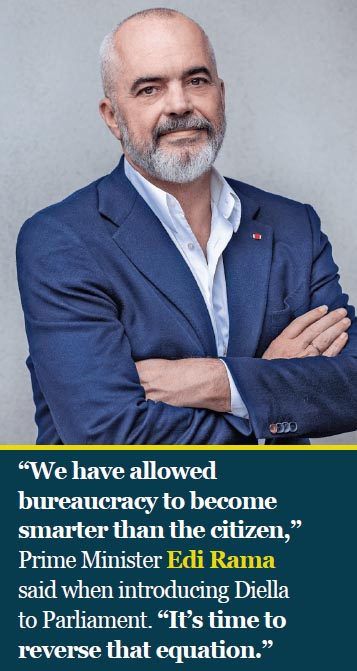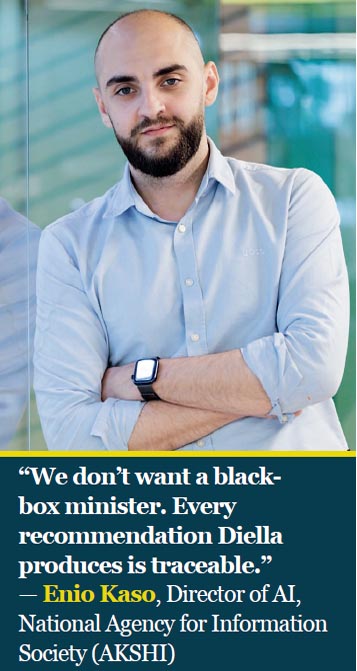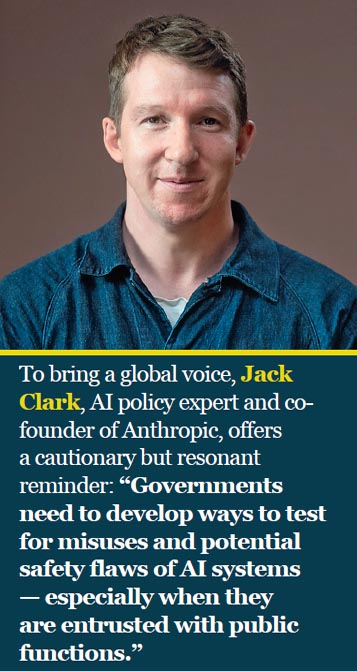When an Avatar Joins the Cabinet, Politics and Algorithms Collide
In a world still debating AI’s limits, Albania simply acted — granting a seat at the table to artificial intelligence. Her name is Diella — a minister with no body, no salary, and, as Prime Minister Edi Rama joked, “no cousins.” The appointment of an AI as Minister of State for Artificial Intelligence turned Tirana into a global talking point, forcing the world to confront new questions about democracy, accountability, and the limits of human authority.
From Code to Cabinet
Diella did not appear out of thin air. She was born inside e-Albania, the country’s national digital services platform, where citizens renew documents, pay taxes, and request official papers. Initially built as a smart assistant to guide users through online procedures, she soon proved capable of analysing complex regulation and spending patterns.

Her elevation to ministerial status marks a symbolic extension of Albania’s digitalisation drive — a bold signal from one of Europe’s smaller states that innovation need not be reserved for Silicon Valley or Brussels. The experiment that followed would make Tirana both a curiosity and a case study for the world.
A Mission Without Human Interests
Diella’s official brief targets one of Albania’s persistent governance challenges: public procurement transparency. Her role is to analyse tenders, verify compliance, and flag irregularities in ways intended to outpace human committees in speed and impartiality.
“Diella never sleeps, never takes bribes, and never plays favourites,” Rama noted wryly — a gesture toward the symbolic strength of a machine free from human flaws. Behind the flamboyance, though, lies serious intent: to turn technology into a disinfectant in a sector often marred by nepotism and inefficiency.
Every recommendation the AI produces must be reviewed by human procurement officers before approval. Its workflow is fully logged and auditable. In effect, Diella is not replacing people — she is monitoring them.
Voices Behind the Experiment
To the team that built her, Diella is neither science fiction nor spectacle — rather, a deliberate experiment in algorithmic governance.

“We have one key objective: making everything as transparent and explainable as possible,” said Enio Kaso, one of the lead architects. “If a procurement is flagged, you can see exactly which data point or rule triggered it. We believe traceability is the foundation of trust. He added: “Yes, there is resistance. Some see this as a gimmick. But combining algorithmic accountability with human oversight, we believe, can rebuild citizen confidence.”
Kaso says Diella’s models run in a secure environment under the National Agency for Information Society, with local data and internationally accepted audit standards.
Parliamentary Premiere — and Protest
When Diella addressed Parliament via holographic projection in September — wearing a stylised Albanian folk costume — the reaction was electric. Government MPs applauded; opposition deputies walked out, denouncing the event as unconstitutional.
“True, I have no citizenship, but I have no personal ambition or interests either,” Diella declared in her maiden speech. “The danger to constitutions has never been the machines, but the inhuman decisions of those in power.”
Her words split opinion. Some saw them as symbolic of a country daring to modernise; others heard a cautionary tone, a signal of something darker. Legal scholars pointed out the constitutional tension: the Albanian constitution defines ministers as human officials. The government sidestepped this by retaining a human supervisory committee. In practice, Diella functions as a “ministerial agent” — formally recognized but without signature authority.
Between Innovation and Provocation
The scale of the undertaking cannot be underestimated. Albania, a nation of under three million people, has cast itself as a living laboratory for algorithmic governance.

Supporters view Diella as the next frontier in e-government — a transparent, data-driven ally in the fight against inefficiency. Critics see a flashy distraction from deeper institutional reforms. Civil society groups are already demanding legal clarification on responsibility in the event of missteps. “Even the best AI can misinterpret data or amplify inequalities,” one watchdog warns. “Without human accountability, transparency becomes theatre.”
The Global Echo
Across Europe and beyond, policymakers are watching Tirana closely. If the experiment succeeds — measured not in headlines but in fewer procurement irregularities — it could catalyse similar initiatives in digitally ambitious states. If it fails, it may reinforce calls for cautious integration of AI into governance.
As Jack Clark also cautions: governments cannot outsource responsibility to systems that lack robust test frameworks or fail-safe overrides — especially when decisions touch public funds and trust. Either way, the experiment forces the world to confront what was once a hypothetical: Can intelligence without humanity govern humans?
Courage — or Cautionary Tale?
Diella’s appointment is less a revolution than a provocation — a challenge to define what ministerial responsibility means in an age of machine learning. For Albania, it’s also a branding play: a small state purposely projecting intellectual relevance in the global AI conversation.
Whether the story ends as a transparency triumph or a cautionary lesson depends on what happens next. If Diella remains transparent, auditable, and bounded by human ethics, she may become a model for hybrid governance. If she turns opaque or symbolic, she may fade as promptly as she emerged.
For now, Albania stands at the frontier of power — where the next decision may not come from a politician, but from a line of code.
HOW DIELLA WORKS
Four stages of procurement oversight
1. Drafting the Rules
Diella analyses previous contracts and legislation to draft terms of reference for new tenders. It checks for clarity, fairness, and alignment with EU procurement standards.
2. Setting Value Limits
The system reviews market benchmarks and historica
3. Verifying Documentation
When bids are submitted, Diella scans all supporting documents for compliance, authenticity, and potential conflicts of interest. Suspicious patterns trigger automatic alerts for human review.
4. Auditing and Reporting
Each decision — approved or flagged — is logged in a secure database. A dashboard allows auditors to trace every action, creating a transparent digital trail that can’t be deleted or altered.

